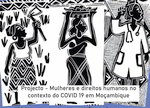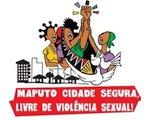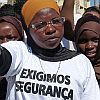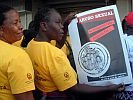Denounce as a Matter of Urgency:
Murder Unpunished in Manhiça
WLSA Mozambique
Flicking through the weekly Magazine Independente of March 5 this year (2008), one learns of a violent episode in the 3 de Fevereiro Administrative Post, in Xinavane, Manhiça district.
According to the paper, the drama involved Percina Timana and Alberto Mucasse, at the time secretary of the trade union committee in the Xinavane sugar plantation who were living together in a common law marriage. It was reported that:
- On 25 February, following a heated argument, the aggressor got into his four by four truck and drove off suddenly, running down the victim.
- He did nothing to help her, leaving her motionless and bleeding.
- According to the paper, it seems that the aggressor went to the house of his second wife in Xinavane, and then went to visit a relative without any concern about his wife, whom he had run down hours before.
- The victim died.
These facts were corroborated by other local sources as Percina was run down in a public place, in front of her stall, in the presence of customers and other colleagues in the market who helped her and took her home. They added that after Alberto Mucasse ran her down and drove off without stopping, they went to tell him that his partner was seriously injured, but he only returned home to find out what happened many hours after he was told.
Another edition of the same weekly, Magazine Independente, of 26 March, contains a news item with the following headline: “Spirit of dead woman takes revenge on murderous widower”. It said that Alberto Mucasse had been released from the Manhiça District police station prison, on the one hand, after pleading guilty, and on the other hand for agreeing to give a stall and a house to his stepchildren, that is, the children of the deceased woman. It reported that the Timana family, the family of the deceased, had forgiven Alberto Mucasse in exchange for these goods. The paper also stated that he was no longer the secretary of the sugar plantation trade union committee, implying that this was the punishment for what he had done.
This situation has raised a number of concerns that require immediate and urgent measures. Analyzing the case under the country’s criminal law, the following crimes were committed:
- Manslaughter, in the event of no proof of whether the incident that resulted in the victim’s death was intentional or not. Whatever the case it is a public crime.
- Refusal to provide assistance to the needy person, whether by not stopping after the accident, or by only reacting much later after being informed that the victim was seriously wounded and in the couple’s home, awaiting transport to a health facility to receive assistance. According to the law and under the most elementary civic conduct this is an aggravating fact.
It must also be stated that Percina Timana had been the victim of domestic violence for many years. We learned that she often requested assistance from the Office for Legal Assistance to Victims of Violence, OLAVV) in the Manhiça district capital. She requested assistance in persuading her partner, Alberto Mucasse, to stop hitting her. She said she could not go back to her parents’ house because brideprice had been paid and her parents were unable to pay it back. One of the problems in getting Alberto Mucasse to stop hitting her was that, according to local norms, he was considered a wealthy and influential person, so all efforts were useless.
In our opinion, the constant aggression against the victim and the lack of immediate assistance clearly shows that the incident was voluntary and, unless there is proof to the contrary, premeditated. As a public crime, the case should have been investigated immediately by the local police authorities in order to detain the presumed guilty person. Indeed, it seems that this is what happened initially. However, if what the paper states is true and indeed is confirmed by local sources, Alberto Mucasse was freed after spending one day in prison, at the request of the victim’s family, who withdrew the complaint because they had reached an agreement whereby the supposed murderer would pay material “compensation” that would benefit the children of the dead woman. This is where the irregularity by the police starts: a public crime cannot just be filed away at the request of the victim’s relatives, or anyone.
We repeat, if what the paper says is true and what is repeated by local sources is true, then the message to citizens is that they can kill anyone if afterwards they are willing and able to “compensate” the victim’s family. Faced with such a major irregularity on the part of the police, we can also think that if the victim had been a man, the authorities would probably have been stricter. As the case involves a woman, indeed the “the owner of the wife”, the crime becomes a private one.
It should also be noted that the journalist who signs the article does not know the law (which is inexcusable for someone who writes on criminal matters) or if he does, he thinks it is normal that the case was not followed through, because at no time did he comment on the bizarre behaviour of the police authorities or the prosecution.
Given this situation, on behalf of WLSA Mozambique and exercising our rights as citizens, in April we wrote to the Attorney General’s Office to denounce the public crime that culminated in the death of Percina Timana, demanding that measures be taken in accordance with the law. The immediate reply we received was that the denunciation would be investigated and that we would be subsequently informed of the situation. So far, when this issue went to press, we had not heard from them.
The way this case happened is as terrible as it is disturbing. How many women all over the country are being attacked and killed without justice being done? How many times and how much longer will the police and other entities in the justice system continue to see women as second-class citizens, and judge them not according to the law but according to customary practice? How long will public indifference persist, when people read in the newspaper about a crime of this nature and that it went unpunished? What can we expect in the future?
This case also leads us to reaffirm the need for a specific law covering crimes of domestic violence in the context of marital relations, an initiative by women’s organizations concerned at the seriousness of the situation in the country. The bill has been in Parliament since 2007, awaiting approval.
We would like to conclude by recalling the very sad story of Percina Temana, whose final years were lived in an environment of tremendous violence and who died in such a shameful manner. We regret that she was not allowed to live in peace and safety, enjoying life, an inalienable right of all human beings.
For the life of women, no more deaths!
* * *







 Information in English
Information in English



















